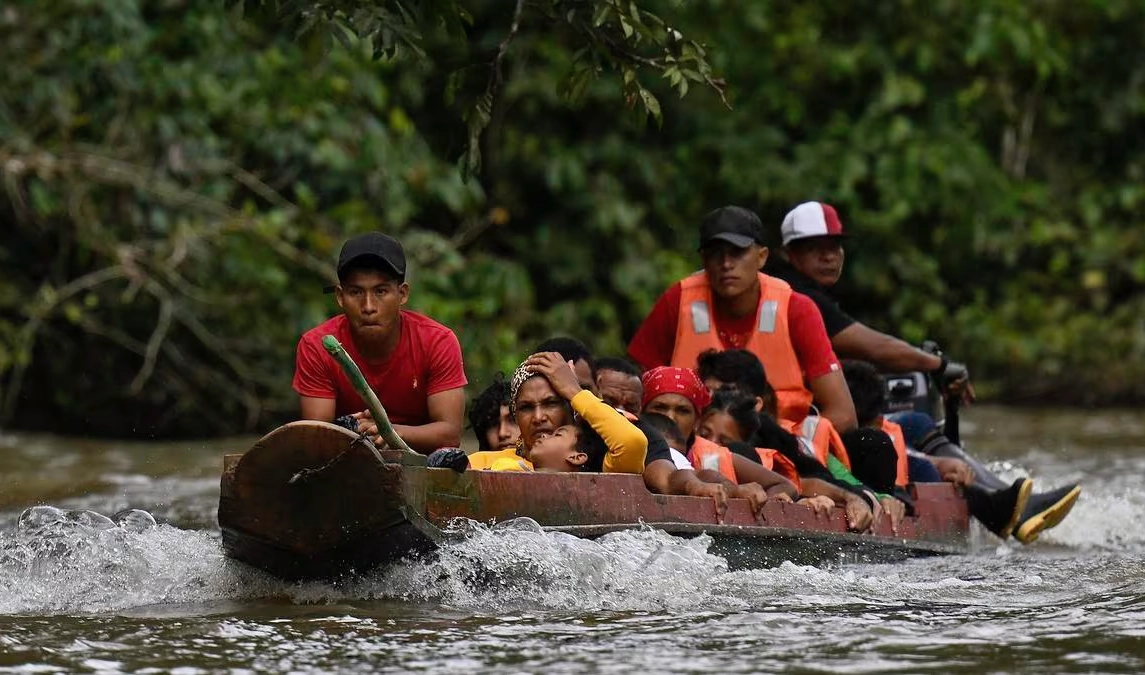Venezuelan Carolina Jiménez, who presides over the non-governmental Washington Office on Latin America (WOLA), has highlighted the following figure: 1% of Venezuela’s total population crossed the Darien jungle in 2023. Breaking down Panama’s official figures, another number is equally shocking: during each hour of last year, an average of 37 Venezuelans were counted crossing this dangerous and inhospitable migratory corridor.
According to official figures from the Panamanian authorities, in 2020 only 8,594 migrants crossed the jungle that separates the country and Colombia. The following year the phenomenon multiplied and reached 133,726 people. In 2022, there were 248,283 and in 2023, the figure, in itself revealing a major crisis, simply doubled to 520,085.
328,667 Venezuelans, 57,222 Ecuadorians, 46,558 Haitians, and 25,344 Chinese constituted “the most recurrent nationalities crossing” during the past year, according to the Panamanian Ministry of Public Security.
Jiménez has drawn attention, in particular, to the massive exodus that is being registered from Venezuela, in response to the humanitarian crisis — deepened in 2023 — and the lack of democratic exits in the midst of what analysts estimate has been a process of stabilization of the dictatorship of Nicolás Maduro.
Surveys reveal that Venezuelans not only have serious problems when it comes to accessing basic services, as well as a situation of dissatisfaction in terms of health and food but also that hopelessness has spread due to the lack of prospects for change.
For Jiménez, it is scandalous that 63% of all migrants who crossed the Darién on foot in 2023 were Venezuelan. These 328,667 Venezuelans represent, moreover, 1% of the total population of Venezuela.
“Let’s look at the magnitude of the figure: slightly more than 1% of the entire population of Venezuela crossed an inhospitable jungle in one year. This is forced migration. What a tragedy,” commented the president of WOLA, a well-known human rights activist.
This total number of Venezuelans crossing through the Darien in 2023 also translates into 900 crossings per month and 37 per day. If the migratory flow were a continuous passage of people, we could establish that every 110 minutes last year a Venezuelan citizen was registered by the Panamanian authorities when leaving the Darien jungle.
Not all those crossing through the Darien have left Venezuela in recent times. With the massive migration of Venezuelans, a process of re-migration is also taking place. These are migrants who, being already outside of Venezuela, decide to move to another country, in some cases passing through their native country only to visit, as we have observed directly in several cases. The absence of data on entries and exits by the Venezuelan government adds to the difficulty of determining what is happening.
If we go by the figures offered by the R4V platform, which brings together the efforts of two specialized UN agencies, UNHCR and IOM, in August 2023 there were 7.71 million Venezuelans who had massively emigrated from their country, a phenomenon that began to be registered significantly in 2015. The vast majority (6.53 million) are based in Latin American and Caribbean countries.
The latest 2023 figure by R4V, from November 30, practically offered very similar figures to those of August. In what way can we interpret that? From my perspective, there is a mobilization of migrants who were already out of Venezuela to a third country and whose bet often is to reach the United States. On the other hand, there are flows of migrants on the move, which generates difficulties in counting and documenting them.
In addition to the overland departure of “Venezuelan walkers” to Colombia and Andean and Southern Cone countries, in 2023 the destination changed: Panama, Central America, and Mexico were first to try to cross to the United States. Likewise, there was a significant but unaccounted air departure to Spain and the United States (both beneficiaries of the Humanitarian Parole and those with tourist visas with the intention of staying).
WOLA, as well as various international and national organizations, insists on its calls to governments throughout the continent to implement measures to protect the human rights of migrants in the region.
“There are multiple interconnected factors, ranging from limited access to fundamental rights and essential services to the impact of violence and insecurity, that continue to push people into situations of displacement,” said José Samaniego, director of the UN Refugee Agency in the Americas, in assessing what surrounds the huge migratory transit through the Darien.
According to a Crisis Group report released in late 2023, illicit profits have skyrocketed as the flow of migrants increases, with much of the money going to organized crime, which has found a lucrative business in smuggling these people. The strengthening of criminal networks both in the Darien Gap and on the Colombian side, usually linked to illicit drug trafficking, adds to the complexity of the situation.
According to Crisis Group estimates, the criminal groups that control both human and drug transit through the Darien Gap receive between US$50 and US$80 for each migrant. Control of this illicit business is in the hands of the Gaitanistas, also known as the Gulf Clan, which, as InSight Crime notes, rose from the ashes of Colombia’s paramilitary movement and became a nationwide criminal force within Colombia with extensive ramifications in the Darien.
The Gaitanistas, according to the think tank’s documentation, are not directly involved in the movement of migrants, but take a percentage of the revenue earned by coyotes and other service providers, such as transport and accommodation companies.
The combination of a massive flow of migrants, the lack of consensus among the region’s governments and the impassive gaze of the authorities, and this organized criminal presence, among other elements, have ended up turning the Darien jungle into a kind of Gordian Knot.
*Translated by Janaína Ruviaro da Silva from the original in Spanish.












